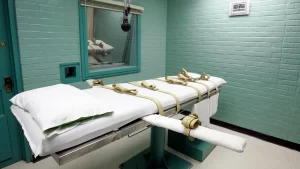 [Editor’s Note: Father Jeff Hood is an advocate for the condemned on death row. He is a voice for those without voice and without compassion. Father serves at Saint Miriam as our Chair for Faith, Justice, and Humanitarian Efforts and works closely with our team to ensure we remain vigilant and on target to continue to be a voice of compassion. You can join Father in his next virtual Zoom conference on Holy Saturday entitled, God, Please Don’t Excuse Me.” by Clicking Here.]
[Editor’s Note: Father Jeff Hood is an advocate for the condemned on death row. He is a voice for those without voice and without compassion. Father serves at Saint Miriam as our Chair for Faith, Justice, and Humanitarian Efforts and works closely with our team to ensure we remain vigilant and on target to continue to be a voice of compassion. You can join Father in his next virtual Zoom conference on Holy Saturday entitled, God, Please Don’t Excuse Me.” by Clicking Here.]
*Arthur Brown, Jr. was executed on March 9, 2023. I wrote this post earlier in the day to reflect on what was to come.
These are dangerous times. Our ability to interact with each other is limitless. Yet, our understanding of our common humanity seems to decline with each second — as if the more we connect, the less we really see each other. The less we are willing, even, to see ourselves beyond the masks we put on for society’s approval.
Indeed, our inability to love ourselves is precisely the source of our inability to engage with the other — including those we’ve condemned to death.
Who are we? We have ritualized killing. In the process, we teach each other that killing is OK. Morality doesn’t exist in a void; it exists in the places where we make moral decisions. The moral ethic of the chamber is death — and, ultimately, that says more about us than about the condemned.
When I visited Arthur last night he told me: “We live in the most supposedly Christian society in global history and yet we can’t seem to morally advance enough to stop killing each other.”
For decades, it has been presumed that Brown (along with co-defendants Marion Dudley and Antonio Dunson) brutally murdered Jose Tovar, Jessica Quinones (seven months pregnant), Frank Farias and Audrey Brown. In recent days, Arthur Brown Jr.’s attorneys have revealed critical new evidence in their final filings that could exonerate their client.
Unfortunately, society is conditioned to dismiss such claims as desperation. What’s wrong with desperation? Isn’t it part of the human condition to be desperate to preserve life? Maybe the wisest thing we could do when we think someone seems desperate is to figure out a way to connect our own desperation — that all of us inevitably feel at points in our lives — to the desperation they feel. Now is the time to try to touch Arthur Brown Jr., to try to find some level of empathy with him. Not to run away.
Maybe in encountering his final appeal, we might find a life worth saving, a life not all that different from our own. Then again, if we would take the time to listen, we would figure out that they’re all worth saving, because they are us and we are them. Our interconnectivity makes us human. Our ability to develop love for each other makes us divine.
If we are to see where God is, to know where love is, we must be willing to see and to be seen; to step into places of deep discomfort and offer our true selves. To do anything other than place our bodies into life, into the pursuit of being human, is to fail at the one thing that matters most: love. Love of self and love of neighbor.
How are we to recapture any semblance of moral imagination? Surely, we must look to the evil we hide in the chamber.
As his spiritual adviser, I’ve been asked by Arthur Brown Jr. to accompany him to the execution chamber. If he is executed, I will watch him die. This is real. Legitimate, moral questions always are. At stake is who we are.
Father Jeff Hood
